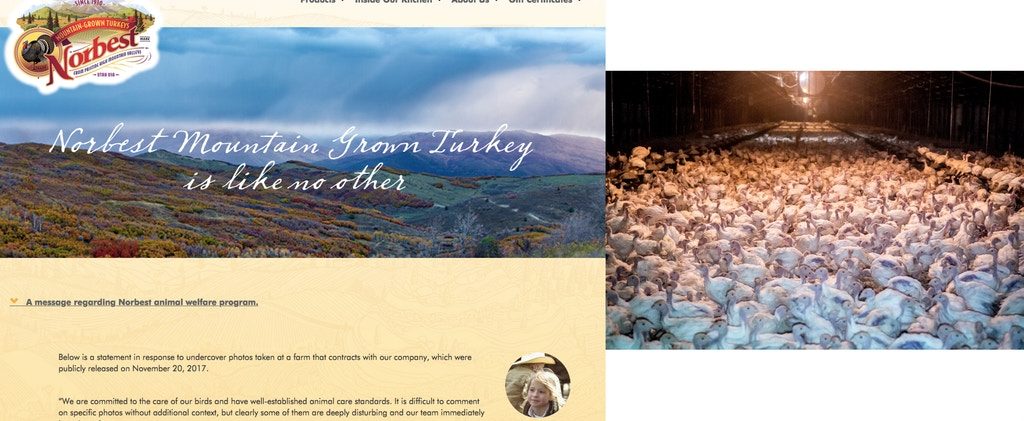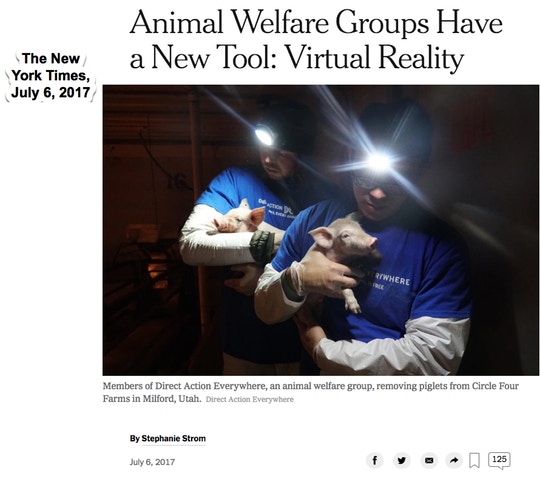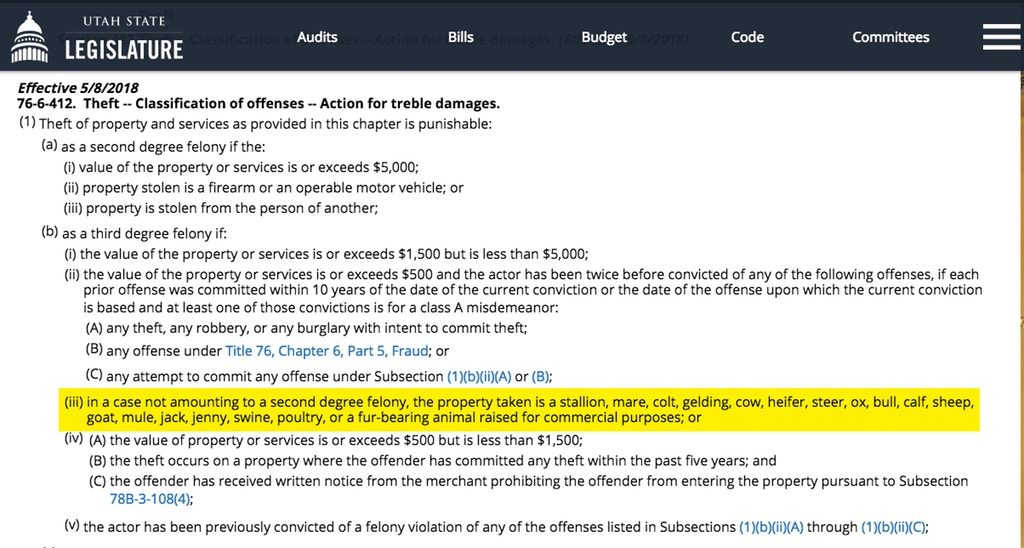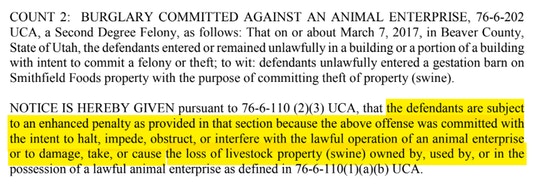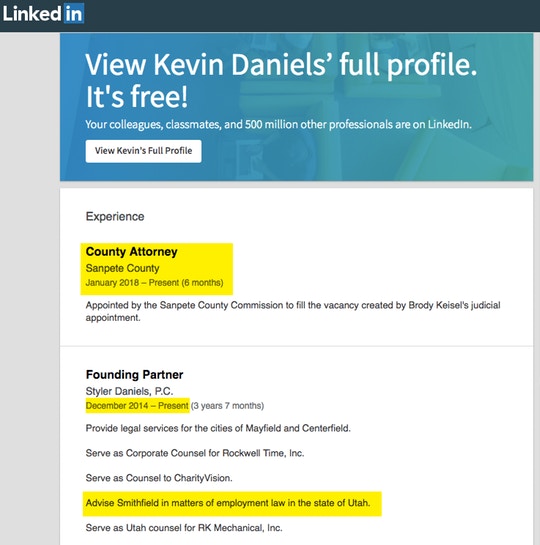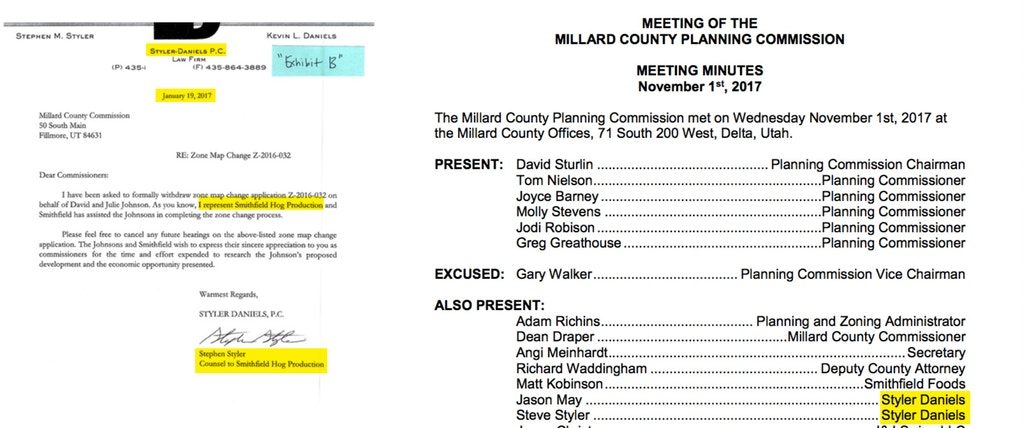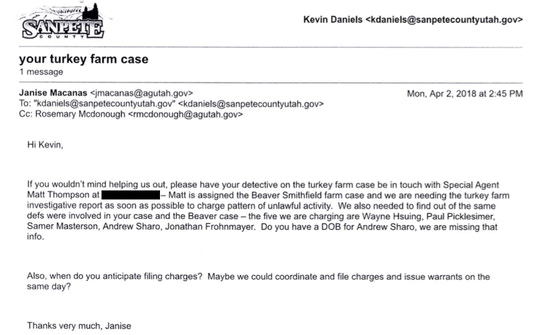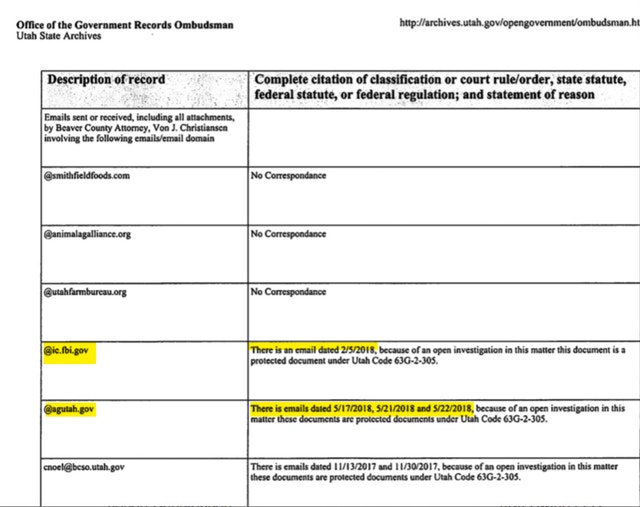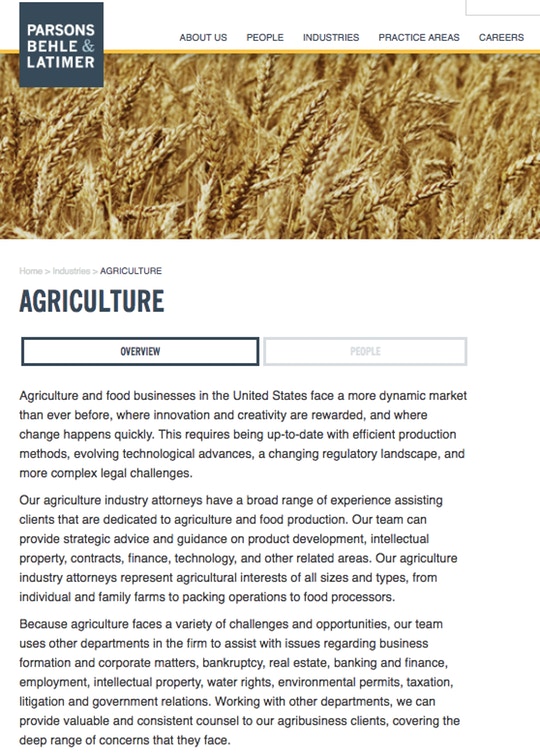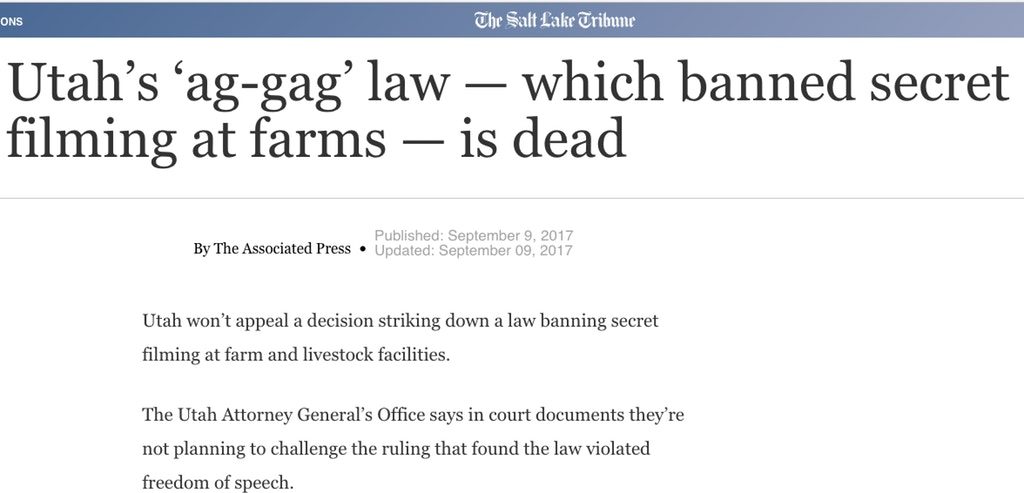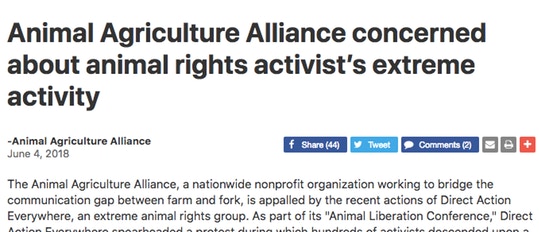Animal Rights Activists Face Multiple Felony Charges, Brought by Prosecutors with Ties to Smithfield Foods
ANIMAL RIGHTS - VEGETARIANISM, 11 Jun 2018
Glenn Greenwald, Lee Fang and Leighton Akio Woodhouse – The Intercept
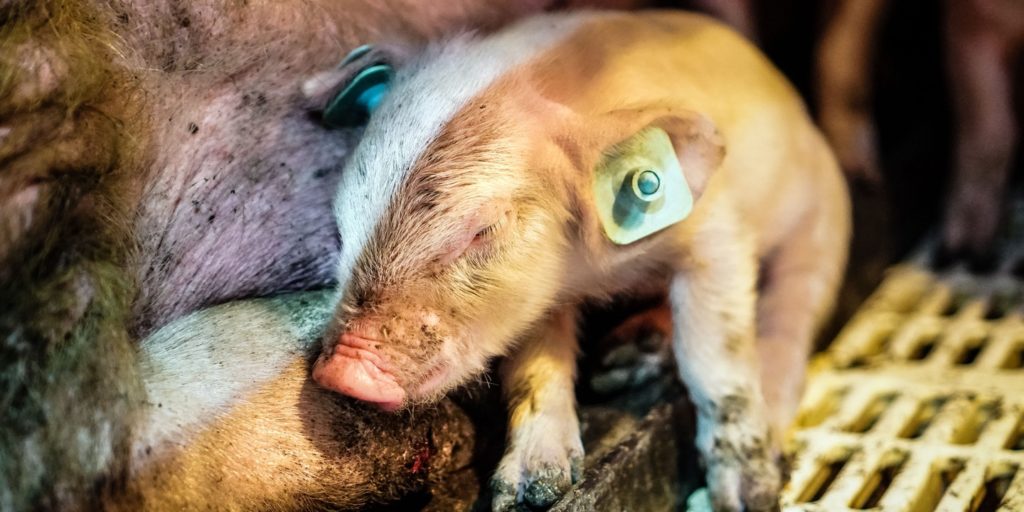
Piglets huddled up against their mothers when they were sick or starving at Smithfield-owned Circle Four Farms in Utah. Photo: Wayne Hsiung/DxE
7 Jun 2018 – Six animal rights activists in California have been charged with multiple felony counts in two separate criminal cases brought by Utah prosecutors last month. If convicted, they could face many years in prison.
These charges raise serious questions about whether prosecutors are attempting to unconstitutionally punish the activists for filming, documenting, and exposing abuses by the agricultural industry that dominates the state, and particularly whether the prosecutors have acted with improper motives because of their own extensive ties to that industry.
httpv://www.youtube.com/watch?v=widL7WL0uQ0
The first criminal case, reported by The Intercept last month, was brought by Sanpete County Attorney Kevin Daniels. It charges six activists with two felony charges that, at least as provided by the cited statutes, carry possible prison terms of five years each.
That case arises out of the filming of horrific conditions at an industrial farm that supplies turkeys to Norbest, a large company that aggressively markets itself to the public as selling “mountain grown” turkeys who are treated with particularly humane care. Norbest is now owned by a supplier of Whole Foods.
Last year, the activists entered the facility and filmed the horrifying conditions in which the turkeys were encaged. The activists also rescued three severely sick and injured turkeys who were on the brink of death, brought them to a veterinarian for medical care, and then to a sanctuary to live.
Even Norbest’s corporate executives acknowledged that the factory farm conditions these activists exposed were unacceptable. After the activists’ exposé, Norbest terminated its contract with that facility. The contrast between the company’s bucolic branding and the reality that the activists exposed was stark.
The second criminal case, reported by the Washington Post last month, was brought by the Utah Attorney General’s Office, led by state Attorney General Sean Reyes. It charges five of the same activists with five separate felony charges, including “rioting,” racketeering, and felony theft. These charges, accumulated together, could conceivably entail sentences of decades in prison.
The charges in this second prosecution are based on the activists’ filming of the conditions for pigs at Smithfield-Foods-owned Circle Four Farms. That investigation generated significant media attention about the conditions there, which were at odds with the claims Smithfield had made publicly.
After that Smithfield investigation, the New York Times published a large story heralding the activists’ use of virtual reality technology to powerfully document abusive conditions inside Smithfield’s factory farms. Vox also featured a lengthy article, based on the work of these same activists, that described the hideous abuses at Smithfield facilities. The Intercept’s report on the treatment of pigs by Smithfield and the subsequent FBI investigation into these activists was one of this site’s most-read articles in its history.
While filming at the Smithfield-owned farm, the activists, following the same “open rescue” model that they used for the recuse of the three Norbest turkeys, took two extremely sick piglets who were near death. They filmed themselves doing so, and then published videos of the rescue and the piglets’ slow recovery into playful, happy, healthy animals after they received veterinarian care and placement at a sanctuary.
The six defendants now facing felony charges from these two cases include retiree Diane Gandee Sorbi, 62, who spends most of her time volunteering at animal shelters; Andrew Sharo, a 24-year-old Ph.D. student in the biophysics program at the University of California, Berkeley; and Wayne Hsiung, a lawyer and lead investigator. All are activists with the animal rights group Direct Action Everywhere, or DxE, which uses only nonviolent means of protest to publicize the usually hidden conditions inside factory farms.
In neither of the two cases did the activists take anything of commercial value. All five of the animals they rescued were virtually certain to die within days, if not hours — well before they could get to the slaughterhouse and be turned into commercially marketable food.
Even if those sickly animals were somehow able to survive until the slaughterhouse, their commercial value would be trivial: the equivalent of taking a few packs of gum. But, given how gravely ill and injured these animals were, the activists’ actions almost certainly saved (rather than cost) these companies money, by alleviating them of the need to pay for corpse disposal.
So why are animal rights activists who took nothing of commercial value, and who injured nobody, facing multiple felony charges and many years in prison? How can that conduct possibly be defined under the law as constituting felony theft, rioting, and racketeering? And how is it possible to criminalize activism that — as its only goal and only outcome — reports on, reveals, and documents the secret, abusive practices of powerful corporations?
The answers to all of those question lie in the same grim reality that has corrupted so much of American democracy: Namely, lawmakers, the legislative process, and the justice system are controlled by the most powerful corporate actors, which abuse and exploit democratic and legal processes for their own interests. That includes abusing the power of the criminal law to punish those who criticize these industries, report on them, and dissent from their practices.
To begin with, the relevant laws in Utah reflect just how brazenly agricultural interests dominate the state’s political system for its own interests. The felony theft statute under which the activists are charged specifies that theft only becomes a felony if the property taken has a value of $1,500 or more.
How, then, can these activists be charged with felony theft given that the commercial value of the five dying animals they rescued is nowhere near that amount? This is possible because Utah legislators, at the behest of the animal agricultural industry, inserted a caveat into this law providing that it is always a felony to take animals raised for commercial purposes, even if the commercial value is trivial or nonexistent:
Note that stealing an animal is automatically a third-degree felony only if the animal is “raised for commercial purposes.” That means that someone who steals a neighbor’s dog or cat would not be committing felony theft under this statute, because the stolen animal is “merely” a beloved pet with less than $1,500 in value.
Taking an animal only catapults into a felony if the animal is being bred or raised by a commercial animal enterprise. In other words, this law has no purpose other than to include a special-favor carve out in the criminal law as a gift to the animal agricultural industry: one that makes it a felony to take an animal being raised for food, no matter what commercial value it has (even if zero).
More revealing still, the law provides for enhanced punishments — including longer prison terms — if the “intent” of the theft is to remove animals from an animal enterprise facility. Thus, for each felony count in the indictment brought against these activists by the Utah Attorney General’s Office, there is a warning of enhanced prison terms beyond what the law already provides:
Just as animal rights activists have been prosecuted on the federal level as terrorists for acts such as releasing minks from cages — under the extremist 2006 Animal Enterprise Terrorism Act enacted with bipartisan support — they are now being prosecuted as racketeers for removing a tiny handful of near-death animals and providing them with veterinarian care.
Then there are the prosecutors themselves. Kevin Daniels, the county attorney in Utah’s Sanpete County who brought the first felony charges against the activists, is a founding partner of a small law firm bearing his name: “Styler Daniels, P.C.” He works simultaneously as county attorney and a partner in private practice at this firm. That firm has represented Smithfield Foods in numerous cases, and Daniels himself — as he boasts on his own current LinkedIn page — has also represented Smithfield.
Indeed, in 2017, Smithfield was the subject of a well-publicized, heated political and legal dispute when local Utah residents opposed Smithfield’s attempts to open a new pig facility near them, on the ground that it would contaminate the water supply and harm the environment.
Residents organized a petition drive against Smithfield and agitated at the planning commission for a denial of the zoning permit. In that fight, Smithfield — as recently as November 2017, just seven months ago — was represented by the small law firm Daniels founded, and in which he still, as he prosecutes these animal rights activists, is a partner.
So this local prosecutor just brought extreme felony charges in the Norbest case against the very same activists who did more to expose the hidden conditions at Smithfield than anyone has in years. At the same time, Smithfied, at least as recently as late last year, is an important, large corporate client at his small law firm.
Though the charges Daniels brought pertain to the Norbest case rather than the Smithfield one, the massive local and national media attention devoted to the Smithfield investigation should create the presumption that Daniels is well aware that the activists he decided to prosecute as felons are the same ones who carried out the investigation of his private law firm’s large corporate client.
Indeed, the FOIA-equivalent request filed by The Intercept with Daniels’s office reveals that, prior to charging these activists with felonies, he was communicating with the Utah attorney general (which filed the felony charges in the Smithfield case):
The Beaver County Sheriff’s Office, which investigated the Smithfield facility, denied a similar records request filed by The Intercept, on the ground that the requested emails relate to an ongoing investigation. The denial letter, however, confirms that local law enforcement corresponded with the Utah Attorney General’s Office as well as the FBI (which, as The Intercept previously reported, actually executed search warrants to collect DNA samples in order to find the two piglets taken from Smithfield just weeks after publication of the New York Times report on the Smithfield investigation):
Then there’s the Utah attorney general, Reyes, whose office filed the criminal case against these activists for the Smithfield investigation. In 2016, when Reyes, as the Republican nominee, sought election as attorney general, Smithfield supported both the Republican Attorneys General Association, or RAGA, as well as the Republican Governors Association.
Reyes’s 2016 campaign was funded, in part, by $310,000 in soft money contributions from the Smithfield-supported RAGA. In fact, in July 2017, the government watchdog group Center for Media and Democracy sued the Utah Attorney General’s Office for refusing to disclose Reyes’s relationship with RAGA and a related group, arguing that “the two ‘cash-for-influence’ organizations promote and coordinate corporate events with GOP attorneys general for its corporate members in the energy, telecom, financial, pharmaceutical and other fields.” (Requests to Reyes’s office for comment were not answered as of the publication of this article.)
Moreover, Reyes — before becoming Utah attorney general — had spent 14 years at one of Utah’s largest law firms, Parsons Behle & Latimer, where he rose to partner. One of that firm’s principal client groups is its representation of the animal agricultural industry, as the firm’s website proudly touts:
In an interview with The Intercept, Daniels, the county attorney, insisted that his law firm’s work for Smithfield poses no conflict of interest in his prosecution of these activists, because of how limited and old he claimed this work is. “No, nope. Not at all actually,” he replied when asked about this conflict. “My work for Smithfield was really limited and awhile ago in time. I did an employment law issue for them. So it had nothing to do actually with their operation at all, other than they had a question as to how — this is that long ago when Obama was still president.”
But the above records prove that the work performed by Daniels’s firm for Smithfield involved a significant public conflict involving contested zoning permits to open a new Smithfield pig facility, and extended to at least the end of 2017.
Daniels also vehemently denied that he was influenced in any way by his ties to this industry: “It would piss me off if they tried to influence me. I’m an independent guy, independent prosecutor. I do what’s right.”
The real reason for these self-evidently excessive prosecutions is obvious. If these prosecutors really believed that the activists committed crimes, then they could charge them with simple trespassing and misdemeanor petty theft. At most, that is what they could be reasonably accused of, given what they did.
But that is not what they are being charged with. Instead, they face multiple felony counts in two separate criminal cases that accuse them of being racketeers, rioters, and felony thieves, and under the relevant statutes, they face years, if not decades, in prison.
Why would multiple prosecutors all coordinate on the federal, state, and local levels to threaten them this way in such blatantly minor cases? Why would the FBI expend substantial resources investigating and searching for two removed Smithfield piglets, out of the tens of millions that are extinguished each year in the U.S. alone?
By far, the most consequential aspect of what these activists are doing is not the symbolic removal of a handful of dying (and thus valueless) animals, but rather, the light they are shining on the abusive conditions within this powerful industry. In other words, they are engaged in classic journalism, activism, and criticism of this industry. That, and that alone, is what makes them so threatening.
Previously, Utah prosecutors and other industry-loyal officials around the country were able to turn animal rights activists who exposed these practices into felons by using so-called ag-gag laws. But now, those laws are increasingly being declared unconstitutional as a violation of free speech rights — Utah’s “ag-gag” law is now dead for that reason — and the industry and its servants in law enforcement and government are desperately searching for alternative means of exploiting and abusing the criminal law to silence, bully, intimidate, and deter them.
Charging activists instead with felony theft, racketeering and rioting — essentially the state court version of a RICO case used on the federal level against mobsters — is the perfect way to circumvent the unconstitutional “ag-gag” laws and once again turn activists into felons. Daniels, the country prosecutor, vehemently denies this motive: “This certainly wasn’t a runaround on the ‘ag-gag’ laws. I’m a big proponent of free speech rights, and I wasn’t a big proponent of the ‘ag-gag’ laws to begin with. … I’m a big marketplace of ideas kind of guy.”
But in a state that is dominated by agribusiness, with all sorts of judges, prosecutors, and officials tied to or dependent upon this industry, it is virtually impossible to envision these activists getting anything remotely resembling a fair trial. Indeed, Daniels acknowledged to The Intercept: “I live in a rural area that is very much dependent on the agricultural industry.”
Other than punishing them for exposing the barbarism of this industry, it is very difficult to see any other motive for overcharging these activists so blatantly. Indeed, an agricultural industry association group, Animal Agriculture Alliance, that advocates for meat consumption and defends the industry from claims of abuse, just issued a statement specifically denouncing DxE as a particular menace.
This industry is obsessed with punishing DxE precisely because the group’s investigations and protests have been so effective in generating media attention regarding the horrors and barbarism of factory farms. The attempt to criminalize their activism is clearly little more than the now-familiar tactic of abusing and exploiting law enforcement powers to stifle dissent against the country’s most powerful factions.
Even if they are not ultimately convicted, the threat of real imprisonment can make even the most devoted activist think twice about engaging in similar actions. And, even if they are acquitted, the legal fees alone can destroy underfunded groups such as DxE and their often impoverished activists. (DxE has created a legal defense fund for its attorneys fees to defend its activists against these criminal cases; those inclined to donate can do so here.)
Constitutional guarantees of free association, free speech, and the right to petition the government for a redress of grievance — all core rights guaranteed by the First Amendment of the U.S. Constitution — are meaningless, empty gestures if the world’s richest and most powerful corporations can use their control over the lawmaking process and law enforcement officials to criminalize the exercise of those rights. That is, plainly, what is taking place with these two criminal prosecutions that seek to imprison peaceful activists as felons for years.
_________________________________________
Glenn Greenwald – glenn.greenwald@theintercept.com
Lee Fang – lee.fang@theintercept.com
Leighton Akio Woodhouse – leighton@leightonwoodhouse.com
Go to Original – theintercept.com
DISCLAIMER: The statements, views and opinions expressed in pieces republished here are solely those of the authors and do not necessarily represent those of TMS. In accordance with title 17 U.S.C. section 107, this material is distributed without profit to those who have expressed a prior interest in receiving the included information for research and educational purposes. TMS has no affiliation whatsoever with the originator of this article nor is TMS endorsed or sponsored by the originator. “GO TO ORIGINAL” links are provided as a convenience to our readers and allow for verification of authenticity. However, as originating pages are often updated by their originating host sites, the versions posted may not match the versions our readers view when clicking the “GO TO ORIGINAL” links. This site contains copyrighted material the use of which has not always been specifically authorized by the copyright owner. We are making such material available in our efforts to advance understanding of environmental, political, human rights, economic, democracy, scientific, and social justice issues, etc. We believe this constitutes a ‘fair use’ of any such copyrighted material as provided for in section 107 of the US Copyright Law. In accordance with Title 17 U.S.C. Section 107, the material on this site is distributed without profit to those who have expressed a prior interest in receiving the included information for research and educational purposes. For more information go to: http://www.law.cornell.edu/uscode/17/107.shtml. If you wish to use copyrighted material from this site for purposes of your own that go beyond ‘fair use’, you must obtain permission from the copyright owner.
Read more
Click here to go to the current weekly digest or pick another article:
ANIMAL RIGHTS - VEGETARIANISM:
